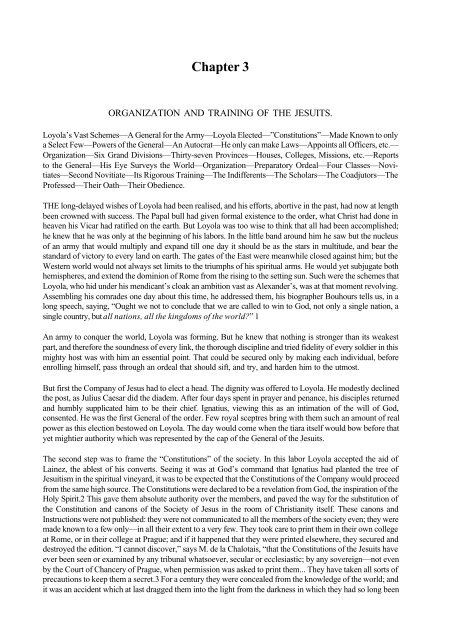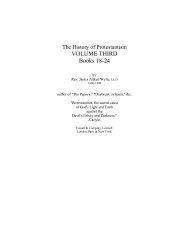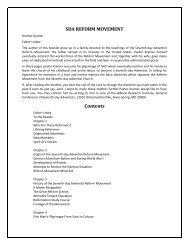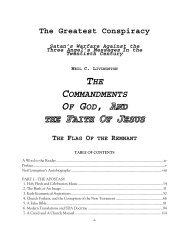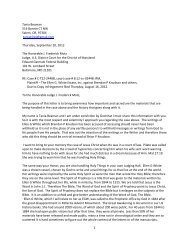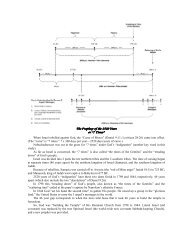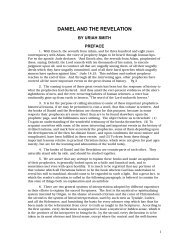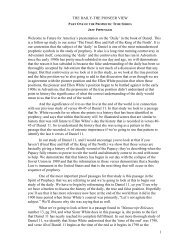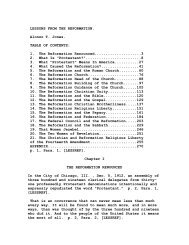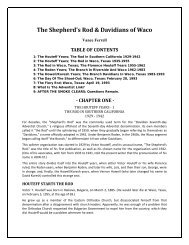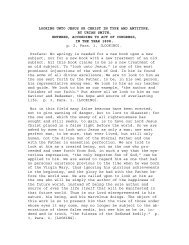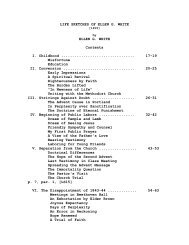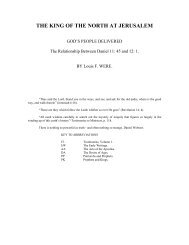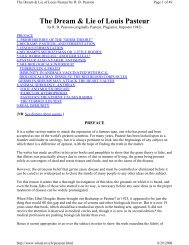History of Jesuits
History of Jesuits
History of Jesuits
You also want an ePaper? Increase the reach of your titles
YUMPU automatically turns print PDFs into web optimized ePapers that Google loves.
Chapter 3<br />
ORGANIZATION AND TRAINING OF THE JESUITS.<br />
Loyola’s Vast Schemes—A General for the Army—Loyola Elected—”Constitutions”—Made Known to only<br />
a Select Few—Powers <strong>of</strong> the General—An Autocrat—He only can make Laws—Appoints all Officers, etc.—<br />
Organization—Six Grand Divisions—Thirty-seven Provinces—Houses, Colleges, Missions, etc.—Reports<br />
to the General—His Eye Surveys the World—Organization—Preparatory Ordeal—Four Classes—Novitiates—Second<br />
Novitiate—Its Rigorous Training—The Indifferents—The Scholars—The Coadjutors—The<br />
Pr<strong>of</strong>essed—Their Oath—Their Obedience.<br />
THE long-delayed wishes <strong>of</strong> Loyola had been realised, and his efforts, abortive in the past, had now at length<br />
been crowned with success. The Papal bull had given formal existence to the order, what Christ had done in<br />
heaven his Vicar had ratified on the earth. But Loyola was too wise to think that all had been accomplished;<br />
he knew that he was only at the beginning <strong>of</strong> his labors. In the little band around him he saw but the nucleus<br />
<strong>of</strong> an army that would multiply and expand till one day it should be as the stars in multitude, and bear the<br />
standard <strong>of</strong> victory to every land on earth. The gates <strong>of</strong> the East were meanwhile closed against him; but the<br />
Western world would not always set limits to the triumphs <strong>of</strong> his spiritual arms. He would yet subjugate both<br />
hemispheres, and extend the dominion <strong>of</strong> Rome from the rising to the setting sun. Such were the schemes that<br />
Loyola, who hid under his mendicant’s cloak an ambition vast as Alexander’s, was at that moment revolving.<br />
Assembling his comrades one day about this time, he addressed them, his biographer Bouhours tells us, in a<br />
long speech, saying, “Ought we not to conclude that we are called to win to God, not only a single nation, a<br />
single country, but all nations, all the kingdoms <strong>of</strong> the world?” 1<br />
An army to conquer the world, Loyola was forming. But he knew that nothing is stronger than its weakest<br />
part, and therefore the soundness <strong>of</strong> every link, the thorough discipline and tried fidelity <strong>of</strong> every soldier in this<br />
mighty host was with him an essential point. That could be secured only by making each individual, before<br />
enrolling himself, pass through an ordeal that should sift, and try, and harden him to the utmost.<br />
But first the Company <strong>of</strong> Jesus had to elect a head. The dignity was <strong>of</strong>fered to Loyola. He modestly declined<br />
the post, as Julius Caesar did the diadem. After four days spent in prayer and penance, his disciples returned<br />
and humbly supplicated him to be their chief. Ignatius, viewing this as an intimation <strong>of</strong> the will <strong>of</strong> God,<br />
consented. He was the first General <strong>of</strong> the order. Few royal sceptres bring with them such an amount <strong>of</strong> real<br />
power as this election bestowed on Loyola. The day would come when the tiara itself would bow before that<br />
yet mightier authority which was represented by the cap <strong>of</strong> the General <strong>of</strong> the <strong>Jesuits</strong>.<br />
The second step was to frame the “Constitutions” <strong>of</strong> the society. In this labor Loyola accepted the aid <strong>of</strong><br />
Lainez, the ablest <strong>of</strong> his converts. Seeing it was at God’s command that Ignatius had planted the tree <strong>of</strong><br />
Jesuitism in the spiritual vineyard, it was to be expected that the Constitutions <strong>of</strong> the Company would proceed<br />
from the same high source. The Constitutions were declared to be a revelation from God, the inspiration <strong>of</strong> the<br />
Holy Spirit.2 This gave them absolute authority over the members, and paved the way for the substitution <strong>of</strong><br />
the Constitution and canons <strong>of</strong> the Society <strong>of</strong> Jesus in the room <strong>of</strong> Christianity itself. These canons and<br />
Instructions were not published: they were not communicated to all the members <strong>of</strong> the society even; they were<br />
made known to a few only—in all their extent to a very few. They took care to print them in their own college<br />
at Rome, or in their college at Prague; and if it happened that they were printed elsewhere, they secured and<br />
destroyed the edition. “I cannot discover,” says M. de la Chalotais, “that the Constitutions <strong>of</strong> the <strong>Jesuits</strong> have<br />
ever been seen or examined by any tribunal whatsoever, secular or ecclesiastic; by any sovereign—not even<br />
by the Court <strong>of</strong> Chancery <strong>of</strong> Prague, when permission was asked to print them... They have taken all sorts <strong>of</strong><br />
precautions to keep them a secret.3 For a century they were concealed from the knowledge <strong>of</strong> the world; and<br />
it was an accident which at last dragged them into the light from the darkness in which they had so long been


